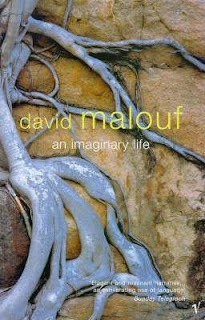AN IMAGINARY LIFE by David Malouf, Book Review: Haunting
 |
| An Imaginary Life – David Malouf |
In An Imaginary Life author David Malouf tells a very big story in very few words.
The story is set in the time of the Roman Empire with the protagonist and narrating character the Roman poet Ovid. Ovid had lived a life of mischief and excess prior to his exile in a backwater called Tomis. He does not understand their language, nor do they understand his – he considers the people he lives with ‘natives’ and the tribes that attack the town of Tomis ‘savages’.
Ovid becomes obsessed with a wild boy believed to have been brought up by deer, devoting his time to teaching him language, seeking to make the boy civilised.
David Malouf’s novella An Imaginary Life was described as an arresting and lyrical work by the Wall Street Journal.
His sentences are flowing and seamless, conjuring up haunting mood and imagery with unique similes.
The moon rode high over the reeds, its face halved by a line of cloud like a lidded eye – my own eye, half-waking, and open like an owl’s eye, half-closed on the dark.
Through this little tale of a boy and a poet Malouf presents his musings on a much grander topic, that of evolution and mankind’s purpose. What is the meaning of life? What is the distinction between instinct and conscious thought and purpose?
Our bodies are not final. We are moving, all of us, in our common humankind, through the forms we love so deeply in one another….. Slowly, and with pain, over centuries, we each move an infinitesimal space towards it. We are creating the lineaments of some final man, for whose delight we have prepared a landscape, and who can only be a god.
This novella is infused with a compelling tension and gravity that made this book very hard to put down. This is a big story, in very few words, with the power to make one question their beliefs.
BOOK RATING: The Story 4 / 5 ; The Writing 5 / 5 — Overall 4.5
An Imaginary Life is available from:
Amazon Book Depository Booktopia AU
Genre: Literature, Historical, Fantasy
Disclosure: If you click a link in this post we may earn a small commission to help offset our running costs.
About the Author, David Malouf
David Malouf is an Australian author. He won the inaugural Australia–Asia Literary Award, the International IMPAC Dublin Literary Award, the Prix Femina Étranger and the Los Angeles Times Book Award. His many published works include Remembering Babylon, An Imaginary Life and The Conversations at Curlow Creek.
- Australia Post gives the stamp of approval to literary legends
- Aussie Author in Focus – David Malouf
